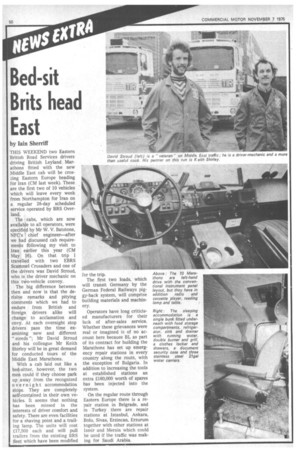Bed-sit Brits head East
Page 52

If you've noticed an error in this article please click here to report it so we can fix it.
by lain Sherriff
THIS WEEKEND two Eastern British Road Services drivers driving British Leyland, Marathons fitted with the new Middle East cab will be crossing Eastern Europe heading for Iran (CM last week). These are the first two of 10 vehicles which will leave every week from Northampton for Iran on a regular 28-day scheduled service operated by BRS Overland.
The cabs, which are now available to all operators, were specified by Mr W. V. Batstone, NFC's chief engineer—after we had discussed cab requirements following my visit to Iran earlier this year (CM May 16). On that trip 1 travelled with two EBRS Scammel Crusaders and one of the drivers was David Stroud, who is the driver mechanic on this two-vehicle convoy.
The big difference between then and now is that the derisive remarks and pitying comments which we had to endure from British and foreign drivers alike will change to acclamation and envy. At each overnight stop drivers pass the time examining new and different "steeds "; Mr David Stroud and his colleague Mr Keith Shirley will be in great demand for conducted tours of the Middle East Marathons.
With a cab laid out like a bed-sitter, however, the two men could if they choose park up away from the recognised overnight accommodation stops. They are completely self-contained in their own vehicles. It seems that nothing has been missed in the interests of driver comfort and safety. There are even facilities for a shaving point and a trailing lamp. The units will cost £17,500 each and will pull trailers from the existing BRS fleet which have been modified for the trip.
The first two loads, which will transit Germany by the German Federal Railways piggy-back system, will comprise building materials and machinery.
Operators have long criticised manufacturers for their lack of after-sales service. Whether these grievances were real or imagined is of no account here because BL as part of its contract for building the Marathons has set up emergency repair stations in every country along the route, with the exception of Bulgaria. In addition to increasing the tools at established stations an extra £160,000 worth of spares has been injected into the system.
On the regular route through Eastern Europe there is a repair station in Belgrade, and in Turkey there are repair stations at Istanbul, Ankara, Bolu, Sivas, Erzincan, Erzurum together with other stations at Ismir and Mersin which could be used if the traffic was making for Saudi Arabia.
















































































































































































































